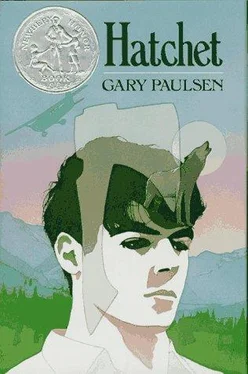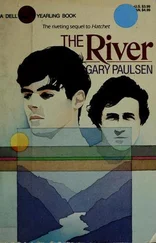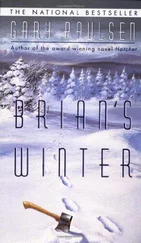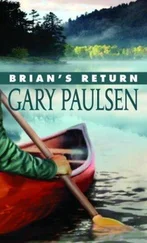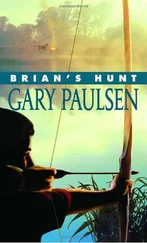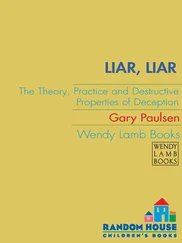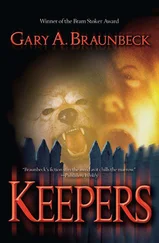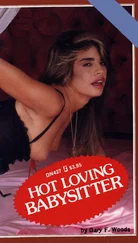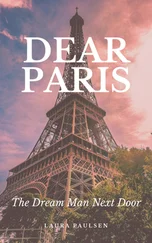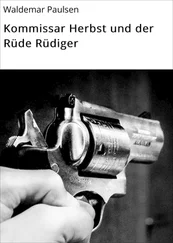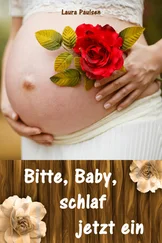In the initial segment of the dream his father was standing at the side of a living room looking at him and it was clear from his expression that he was trying to tell Brian something. His lips moved but there was no sound, not a whisper. He waved his hands at Brian, made gestures in front of his face as if he were scratching something, and he worked to make a word with his mouth but at first Brian could not see it. Then the lips made an mmmmm shape but no sound came. Mmmmm — maaaa. Brian could not hear it, could not understand it and he wanted to so badly; it was so important to understand his father, to know what he was saying. He was trying to help, trying so hard, and when Brian couldn't understand he looked cross, the way he did when Brian asked questions more than once, and he faded. Brian's father faded into a fog place Brian could not see and the dream was almost over, or seemed to be, when Terry came.
He was not gesturing to Brian but was sitting in the park at a bench looking at a barbecue pit and for a time nothing happened. Then he got up and poured some charcoal from a bag into the cooker, then some starter fluid, and he took a flick type of lighter and lit the fluid. When it was burning and the charcoal was at last getting hot he turned, noticing Brian for the first time in the dream. He turned and smiled and pointed to the fire as if to say, see, a fire.
But it meant nothing to Brian, except that he wished he had a fire. He saw a grocery sack on die table next to Terry. Brian thought it must contain hot dogs and chips and mustard and he could think only of the food. But Terry shook his head and pointed again to the fire, and twice more he pointed to the fire, made Brian see the flames, and Brian felt his frustration and anger rise and he thought all right, all right, I see the fire but so what? I don't have a fire. I know about fire; I know I need a fire.
I know that.
His eyes opened and there was light in the cave, a gray dim light of morning. He wiped his mouth and tried to move his leg, which had stiffened like wood. There was thirst, and hunger, and he ate some raspberries from the jacket. They had spoiled a bit, seemed softer and mushier, but still had a rich sweetness. He crushed the berries against the roof of his mouth with his tongue and drank the sweet juice as it ran down his throat. A flash of metal caught his eye and he saw his hatchet in the sand where he had thrown it at die porcupine in the dark.
He scootched up, wincing a bit when he bent his stiff leg, and crawled to where the hatchet lay. He picked it up and examined it and saw a chip in the top of the head.
The nick wasn't large, but the hatchet was important to him, was his only tool, and he should not have thrown it. He should keep it in his hand, and make a tool of some kind to help push an animal away. Make a staff, he thought, or a lance, and save the hatchet. Something came then, a thought as he held the hatchet, something about the dream and his father and Terry, but he couldn't pin it down.
"Ahhh…" He scrambled out and stood in the morning sun and stretched his back muscles and his sore leg. The hatchet was still in his hand, and as he stretched and raised it over his head it caught the first rays of the morning sun. The first faint light hit the silver of the hatchet and it flashed a brilliant gold in the light. Like fire. That is it, he thought. What they were trying to tell me.
Fire. The hatchet was the key to it all. When he threw the hatchet at the porcupine in the cave and missed and hit the stone wall it had showered sparks, a golden shower of sparks in the dark, as golden with fire as the sun was now.
The hatchet was the answer. That's what his father and Terry had been trying to tell him. Somehow he could get fire from the hatchet. The sparks would make fire.
Brian went back into the shelter and studied the wall. It was some form of chalky granite, or a sandstone, but imbedded in it were large pieces of a darker stone, a harder and darker stone. It only took him a moment to find where the hatchet had struck. The steel had nicked into the edge of one of the darker stone pieces. Brian turned the head backward so he would strike with the flat rear of the hatchet and hit the black rock gently. Too gently, and nothing happened. He struck harder, a glancing blow, and two or three weak sparks skipped off the rock and died immediately.
He swung harder, held the hatchet so it would hit a longer, sliding blow, and the black rock exploded in fire. Sparks flew so heavily that several of them skittered and jumped on the sand beneath the rock and he smiled and stuck again and again.
There could be fire here, he thought. I will have a fire here, he thought, and struck again — I will have fire from the hatchet.
BRIAN FOUND it was a long way from sparks to fire.
Clearly there had to be something for the sparks to ignite, some kind of tinder or kindling — but what? He brought some dried grass in, tapped sparks into it and watched them die. He tried small twigs, breaking them into little pieces, but that was worse than the grass. Then he tried a combination of the two, grass and twigs.
Nothing. He had no trouble getting sparks, but the tiny bits of hot stone or metal — he couldn't tell which they were — just sputtered and died.
He settled back on his haunches in exasperation, looking at the pitiful clump of grass and twigs.
He needed something finer, something soft and fine and fluffy to catch the bits of fire.
Shredded paper would be nice, but he had no paper.
"So close," he said aloud, "so close…"
He put the hatchet back in his belt and went out of the shelter, limping on his sore leg. There had to be something, had to be. Man had made fire. There had been fire for thousands, millions of years. There had to be a way. He dug in his pockets and found the twenty-dollar bill in his wallet. Paper. Worthless paper out here. But if he could get a fire going…
He ripped the twenty into tiny pieces, made a pile of pieces, and hit sparks into them. Nothing happened. They just wouldn't take the sparks. But there had to be a way — some way to do it.
Not twenty feet to his right, leaning out over the water were birches and he stood looking at them for a full half-minute before they registered on his mind. They were a beautiful white with bark like clean, slightly speckled paper.
Paper.
He moved to the trees. Where the bark was peeling from the trunks it lifted in tiny tendrils, almost fluffs. Brian plucked some of them loose, rolled them in his fingers. They seemed flammable, dry and nearly powdery. He pulled and twisted bits off the trees, packing them in one hand while he picked them with the other, picking and gathering until he had a wad close to the size of a baseball.
Then he went back into the shelter and arranged the ball of birchbark peelings at the base of the black rock. As an afterthought he threw in the remains of the twenty-dollar bill. He struck and a stream of sparks fell into the bark and quickly died. But this time one spark fell on one small hair of dry bark — almost a thread of bark — and seemed to glow a bit brighter before it died.
The material had to be finer. There had to be a soft and incredibly fine nest for the sparks.
I must make a home for the sparks, he thought. A perfect home or they won't stay, they won't make fire.
He started ripping the bark, using his fingernails at first, and when that didn't work he used the sharp edge of the hatchet, cutting the bark in thin slivers, hairs so fine they were almost not there. It was painstaking work, slow work, and he stayed with it for over two hours. Twice he stopped for a handful of berries and once to go to the lake for a drink. Then back to work, the sun on his back, until at last he had a ball of fluff as big as a grapefruit — dry birchbark fluff.
Читать дальше
